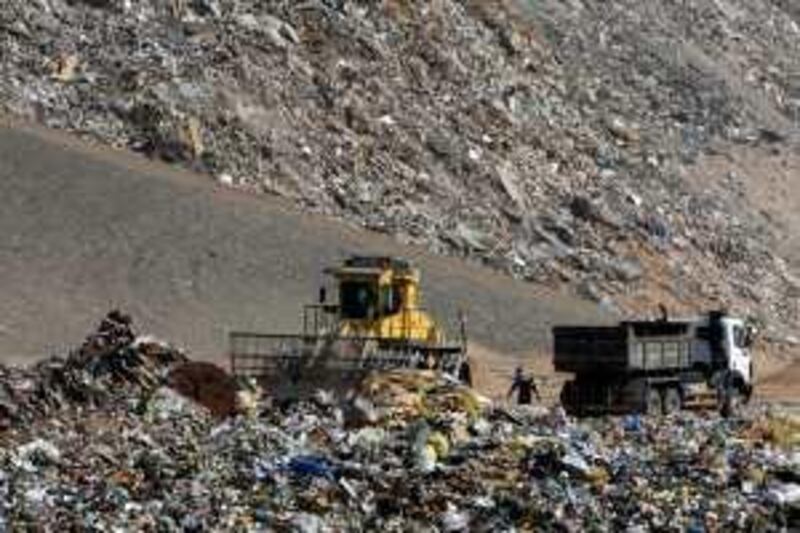Citizen patrols are being stepped up in Dubai in an attempt to stamp out the illegal dumping of rubbish, while a new waste management programme in Sharjah aims to reduce the amount going to landfill by 30 per cent within a year, as the neighbouring emirates work to clean up the environment. The two initiatives were outlined at the Middle East Waste Summit 2009, a three-day event at the Dubai Airport Expo that was launched yesterday and focuses on waste management and recycling solutions. A senior Dubai Municipality official said the community patrolling programme would be made more active to help waste management and control illegal sewage dumping. A team of around 500 responsible citizens had already been enlisted as volunteers to keep a watch for illegal dumping or littering. Hassan Mohammed Makki, director of the municipality's waste management department, said the volunteers had been educated on identifying violations and local municipality orders. Their monitoring activities would be spread across the emirate. Violations of newly launched initiatives such as a ban on spitting betel leaves and littering streets would also be monitored by the volunteers, he said. "We are constantly enhancing and upgrading activities of this group. Apart from violations by companies they now also report to us on individual violations such as littering and spitting of betel leaves." While the volunteers do not issue fines, they immediately report cases where companies are illegally dumping waste and the municipality then takes action. Fines range from Dh300 (US$82) up to Dh3,000 depending on the offence and the number of times it is committed. Hussein Nasser Lootah, the director general of Dubai Municipality, delivering the keynote address at the summit, said waste management was a top priority for Dubai. "In the year 2000, there were 3,000 tonnes a day arriving to the waste treatment plant in Dubai. By the end of 2008 this increased to 11,000 tonnes a day with an increase rate of more than 20 per cent a year. At the same time, construction waste in Dubai increased by almost 30 per cent a year, which is around 60,000 tonnes a day." Agricultural and medical waste showed similar increases. Meanwhile, a public-private partnership between the environmental company Bee'ah and Sharjah Municipality will bring waste management in the emirate in line with international best practices, according to authorities. Sharjah landfill sites currently take 2,000 tons of municipal solid waste daily. James Hartnell, marketing manager at Bee'ah, said that by the end of summer this year a reclamation facility would come online, separating out different materials. "Instead of household and office waste going to landfill, it will go to a materials reclamation facility. Through hand-sorting, magnetism and washing, we can get about 30 per cent of the recyclable waste out," he said. "Western countries with more established recycling facilities can get 60 or 70 per cent out. The issue here is that because it isn't separated at the source, there are degrees of contamination." At the summit in Dubai, Bee'ah launched its latest initiative, Tandeef, which means clean. A street beautification project, Tandeef will see a new fleet of collection vehicles, collection routes monitored by GPS and outdoor vacuum cleaners will collect litter from the streets. Under the Tandeef programme, all waste bins in the emirate will be monitored electronically to let collectors know which have been emptied and which have not. A new fleet of collection vehicles will be imported from Canada and run according to a GPS system so the municipality and drivers can co-ordinate on routes. The design of the new system comes after an analysis of how to maximise the efficiency of waste collection. This initiative will at first serve the Khaled Lagoon and Buhairah Corniche areas before eventually moving across the city. Salim al Owais, acting chairman of Bee'ah's board of directors, said the Tandeef programme would have "immediate benefits" on the cleanliness of the streets of Sharjah. jhume@thenational.ae pmenon@thenational.ae
Community patrols step up checks on dumping
As Dubai grows, so does the problem of its rubbish. The answer is better management - and stopping illegal dumping.

Editor's picks
More from the national




